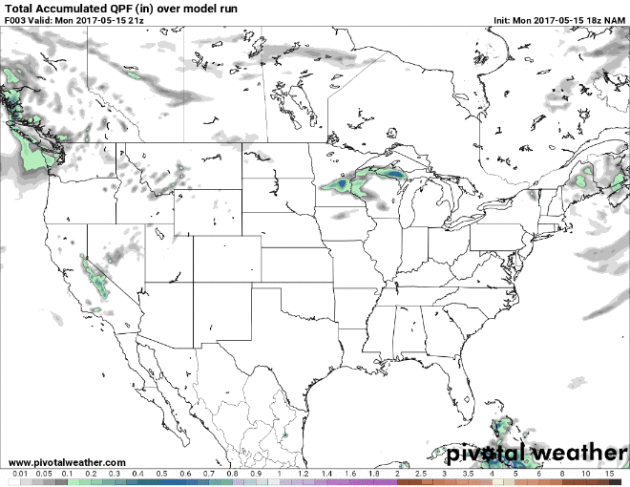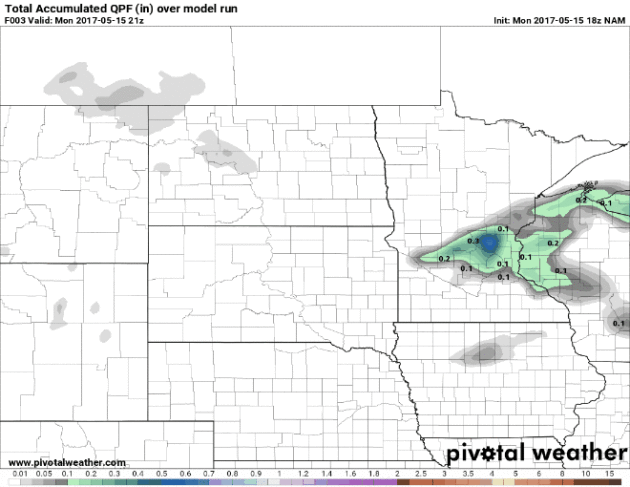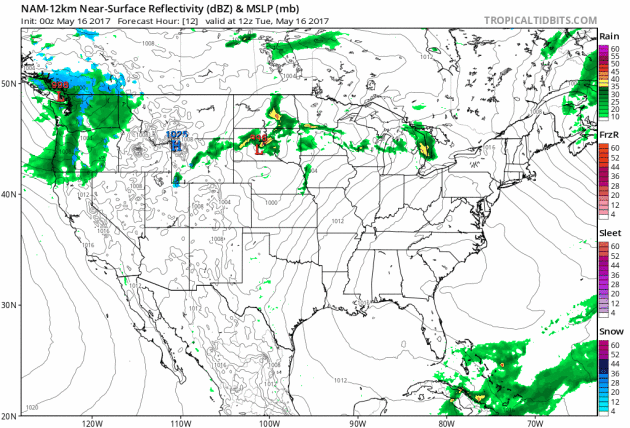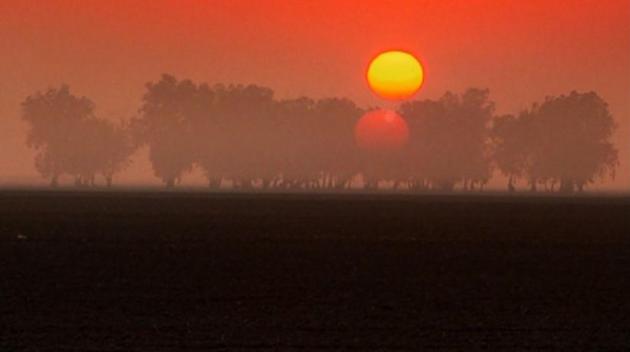.46" rain fell yesterday at St. Cloud Airport as of 7 PM.66 F. high temperature Monday.
69 F. average high on May 15 in St. Cloud.
66 F. maximum temperature on May 15, 2016.
May 16, 1934:
An extreme hot spell results in temperatures over 100 across parts of
Minnesota, and record highs of 94 in St. Cloud and Minneapolis.
Soggy, Potentially Severe Holding PatternGrowing
up the weather had a distinct rhythm, a fairly predictable ebb &
flow. Things clicked, most of the time. Lately, the Symphony of the
Seasons has sounded more like a bored, talent-free 2nd grade orchestra,
screeching away. America's manic weather has been playing out of tune
since the late 90s, and I've been talking about it ever since.
Rapid
warming of the Arctic may be impacting the configuration of the jet
stream with a subsequent slowing of patterns - a greater tendency for
systems to stall, for weather to get stuck for days or even weeks at a
time. Record flooding in Montreal; a record wet winter for California's
Sierra Nevada, after a record 7-year drought; another 1,000 year flood
for Missouri?
Our weather gets stuck this week, with repeated
waves of T-storms and heavy rain. A few storms may turn severe today;
models print out 3 inches of new rain by Wednesday night. By Saturday
night totals may push 3-5 inches for some communities.
Expect 50s
for highs later this week, but 60s return next week with a drier sky;
maybe 70s by Memorial Day? My fingers are crossed.
* 84-hour rainfall prediction above (NAM model) courtesy of NOAA and Pivotalweather.com.
Tuesday Severe Threat.
The best chance of large hail, damaging winds and isolated tornadoes
later today will come from the Texas and Oklahoma Panhandle into central
Kansas, but strong to severe storms are possible as far north as the
Twin Cities and Eau Claire.
Month's Worth of Rain Next 84 Hours.
Most spots will pick up an inch or two of additional rain, but NAM
guidance suggests as much as 4", especially south and east of the Twin
Cities and the Nebraska Panhandle. Animation: Pivotalweather.com.
Late Season Snow?
Yep, that's an awful lot of blue (snow) on the future radar map for the
third week of May, but NAM guidance prints out a few inches of slushy
snow from near Boise and Butte to Park City and the higher terrain of
Colorado. Meanwhile multiple waves of showers and T-storms soak the
Dakotas and Upper Midwest with heavy rain. Generally fair weather lingers
from Atlanta and Huntsville to Boston. Loop: NOAA and
Tropicaltidbits.com.
Big Temperature Swings Coming.
ECMWF and NOAA guidance is consistent: today should be the warmest day
in sight with 80s if there's any sunshine whatsoever. We cool down
fairly dramatically (but no snow, thank you Lord) before temperatures
recover close to average next week. I'd still bet a (stale) bagel we'll
be up near or just above 70F on Memorial Day. MSP numbers: WeatherBell.
 National Drought Recedes to Record Low Level. NOAA
National Drought Recedes to Record Low Level. NOAA has the details: “
April
showers bring May flowers,” or so the saying goes. Perhaps a more
appropriate description this year might be, “Heavy April showers bring
record flooding.” All that rain helped shrink the drought footprint for
the contiguous U.S. to the lowest level since the nationwide Drought
Monitor program began in 2000. It also caused loss of life and extensive
property destruction in many communities. Last month, the average
contiguous U.S. temperature was 53.8 degrees F, 2.7 degrees above the
20th-century average. The month ranked as the 11th warmest April in the
123-year period of record, according to scientists from NOAA’s National
Centers for Environmental Information..."

April 27 Was Second Warmest on Record, Worldwide.
NASA GISS
has the details: "
April 2017 was the second warmest April in 137 years
of modern record-keeping, according to a monthly analysis of global
temperatures by scientists at NASA's Goddard Institute for Space Studies
(GISS) in New York. Last month was 0.88 degrees Celsius warmer than the
mean April temperature from 1951-1980. The two top April temperature
anomalies have occurred during the past two years. April 2016 was the
hottest on record, at 1.06 degrees Celsius warmer than the April mean
temperature. April 2017's temperature was 0.18 degrees Celsius cooler
than April 2016. This past April was only slightly warmer than the third
warmest April, which occurred in 2010 and was 0.87 degrees warmer than
the mean..."
 Farmers Scramble to Adapt to Volatile Weather. The Wall Street Journal
Farmers Scramble to Adapt to Volatile Weather. The Wall Street Journal reports: "
U.S.
farmers are putting aside politics and arming themselves for volatile
weather that they expect will be the new normal. Intense heat waves,
droughts and floods have led to erratic yields in California, Michigan,
Illinois, Georgia, South Carolina, Florida and other agricultural
states. Expecting that trend to continue, farmers big and small are
investing in ways to preserve water in their soil, plant crops more
quickly and irrigate more efficiently. “We are watching springs dry up,”
says Pat O’Toole, a Savery, Wyo., rancher, who uses portable,
solar-powered pumps to retrieve groundwater for his 6,000 sheep and
1,000 cows. “We are aggressively looking at our whole operation.” The
year 2012, with its record-setting heat wave and drought, was a turning
point for many. Growers in 22 states suffered what federal agencies
considered “crop failure,” the worst agricultural calamity since a
severe dry spell in 1988..." (File photo: Rob Koch).
 1 in 1,000 Year Rainfall Caused Missouri Floods.
1 in 1,000 Year Rainfall Caused Missouri Floods.
By my count the USA experienced at least 5 separate thousand-year rains
in 2016, a number that may be topped this year. Here's an excerpt from
USA TODAY: "
The
massive amount of rain that caused the devastating flooding in the past
few weeks in Missouri was a rare 1-in-1,000-year event, meteorologists
said Friday. Most of the “once-in-a-millennium” rainfall from late April
to early May occurred in Texas and Howell counties in southern
Missouri, the National Oceanic and Atmospheric Administration said. Some
areas picked up over a foot of rain within a few hours April 29. "This
incredible rainfall resulted in widespread and historic flooding," the
National Weather Service in Springfield, Mo., said. "Numerous roads,
bridges and buildings were destroyed." Other portions of the state, as
well as parts of Illinois and Indiana, experienced less extreme
rainfall, on the order of 1-in-200 and 1-in-500-year levels..."
 Large Floods Can Flood Aging Sewer Systems with Harmful Bacteria, Viruses.
Large Floods Can Flood Aging Sewer Systems with Harmful Bacteria, Viruses. Well here's an implication of more heavy rain events I hadn't pondered before, courtesy of
terradaily.com: "
Researchers
have discovered a worrying link between heavy rainfall and upticks in
infections caused by bacteria and viruses carried by human waste. The
correlation was identified in cities with aging sewer systems. Modern
sewer systems separate human waste and storm runoff. But in many old
sewer systems, a single pipe handles both. Environmental scientist
Jyotsna Jagai has spent several years studying the human health risks
associated with "combined sewers," which are found in more than 70 major
American cities. In 2014, Jagai began comparing rainfall data with
hospital records in Massachusetts between 2003 and 2007. In cities with
combined sewers, Jagai found heavy rains led to an 13 percent increase
in gastrointestinal disorders linked to human waste-borne bacteria and
viruses..."

Gas-Powered Vehicles Will Vanish in 8 Years, Says US Report.
I'd be amazed if this happens, yet it's hard not to argue with the
trend toward electrification of the world's transportation
infrastructure. Then again, the future never turns out quite the way you
think it will. Here's an excerpt at The Telegraph and
Stuff.co.nz: "
No
more petrol or diesel cars, buses, or trucks will be sold anywhere in
the world within eight years. The entire market for land transport will
switch to electrification, leading to a collapse of oil prices and the
demise of the petroleum industry as we have known it for a century. This
is the futuristic forecast by Stanford University economist Tony Seba.
His report, with the deceptively bland title Rethinking Transportation
2020-2030, has gone viral in green circles and is causing spasms of
anxiety in the established industries. Prof Seba's premise is that
people will stop driving altogether. They will switch en masse to
self-drive electric vehicles (EVs) that are 10 times cheaper to run than
fossil-based cars, with a near-zero marginal cost of fuel and an
expected lifespan of 1m miles..."
Photo credit: "
Vehicles like the BMW i3 electric car are a future that is coming fast according to a report out the US."
Portland Becomes Home to USA's First Electric Showcase. Try before you buy - makes sense to me. Details at
insideevs.com: "
Imagine
a place to check out EVs, learn about EVs, and test drive EVs, with no
hassle to buy (because it’s not a dealership). This is all a reality at
Portland’s new Go Forth Electric Showcase. The Showcase officially
opened in downtown Portland, Oregon, and it’s the first of its kind in
the United States. The Electric Showcase intends to educate without
sales pressure. You can enjoy a fleet of electric cars to compare and
drive, and also use interactive displays to learn about how EVs work.
There is also information related to charging, and station locations.
You can use Forth’s interactive tools to help figure out which EV is
your best fit. Executive director of Forth, Jeff Allen, shared with KGW
Portland:
“It gives them a chance to try
them out, take a car for a test drive, actually practice plugging in the
charger and see what that feels like and learn about all their options
in a stress free environment...”
Photo credit: "
Inside the Go Forth Electric Showcase." (Image Credit: flickr via Zax9000).
Alzheimer's is Type 3 Diabetes? Big Think has a thought-provoking story: "
The
idea that Alzheimer's is a form of diabetic disease has been gaining
currency in medical circles for almost ten years. The accumulated
evidence is now so strong that many specialists are now comfortable
referring to Alzheimer's as type 3 diabetes.
This shouldn't come as a surprise. Insulin doesn't merely signal the
body's somatic cells to take up glucose; it also governs the brain's
uptake of glucose. And glucose is what powers the brain. It's the
brain's primary energy molecule. We've known for some time that the
brain itself makes a certain amount of insulin, and various parts of the
brain are rich in insulin receptors.
It's also well established that cognitive decline is correlated with
both obesity and metabolic abnormalities involving insulin..."
Where Automation Poses the Biggest Threat to American Jobs. Here's an excerpt at
CityLab: "...
A
new analysis suggests that the places that are going to be hardest-hit
by automation in the coming decades are in fact outside of the Rust
Belt. It predicts that areas with high concentrations of jobs in food
preparation, office or administrative support, and/or sales will be most
affected—places such as Las Vegas and the Riverside-San Bernardino area
may be the most vulnerable to automation in upcoming years, with 65
percent of jobs in Las Vegas and 63 percent of jobs in Riverside
predicted to be automatable by 2025. Other areas especially vulnerable
to automation are El Paso, Orlando, and Louisville. Still, the authors
estimate that almost all large American metropolitan areas may lose more
than 55 percent of their current jobs because of automation in the next
two decades..."
Map credit:
The Atlantic, Institute for Spatial Economic Analysis, University of Redlands.
How Untreated Depression Contributes to the Opioid Epidemic. Interesting food for thought at
The Atlantic: "
It can sometimes seem strange how so much of the country got hooked on opioids within just a few years. Deaths from prescription drugs
like oxycodone, hydrocodone, and methadone have more than quadrupled
since 1999, according to the CDC. But pain doesn’t seem to be the only
culprit: About one-third
of Americans have chronic pain, but not all of them take prescription
painkillers for it. Of those who do take prescription opioids, not all
become addicted. Several researchers now believe depression, one of the
most common medical diagnoses in the U.S., might be one underlying cause
that’s driving some patients to seek out prescription opioids and to
use them improperly. People with depression show abnormalities
in the body’s release of its own, endogenous, opioid chemicals.
Depression tends to exacerbate pain—it makes chronic pain last longer
and hurts the recovery process after surgery..."
File photo:
Jonathan Ernst / Reuters.
Press the Button. Do you like ordering up food on tablets?
Miss the human interaction? How will automation impact the food
services industry, which employs 10% of the American workforce? Here's
an excerpt of an interesting post at
Lucky Peach: "...
On
a smaller scale, that’s what’s likely to play out in the restaurant
industry, if server and cashier automation picks up the pace. Fast
casual and fast food restaurants are already weighted toward kitchen
staff, and replacing front-of-house workers with more efficient
computerized systems (that also reduce the time customers spend at the
table) will only increase the order volume that a given restaurant
can process. This change mirrors the larger hollowing out of
middle-income jobs in America. Because unless something drastic happens,
all those new back-of house jobs are going to be worse than the waiting
jobs they replace. For all the love that the food media showers on
chefs, the overwhelming majority of kitchen jobs are still extremely
poorly paid..."
Your Shoes Will Be Printed Shortly. 3-D printers will be capable of amazing things, as reported at
The Wall Street Journal: "
This
may be the year you get 3-D-printed shoes. By the end of 2017, the
transformation of manufacturing will hit a milestone: mass-produced
printed parts. Until now, that concept was an oxymoron, since 3-D
printing has been used mainly for prototyping and customized parts. But
the radical innovation of 3-D printing techniques means we are finally
going to see some previously impossible designs creep into our consumer
goods. In the long term, it also means new products that previously
would have been impractical to produce, and a geographical shift of some
manufacturing closer to customers..."
Photo credit: "
Adidas’s
Futurecraft 4D performance runnning shoes feature plastic midsoles
crafted using “digital light synthesis” 3-D printing technology
pioneered by Carbon Inc."
Why Would Aliens Even Bother With Earth? If they're reading our tweets they'll steer clear. Here's a thought-provoking post at Literary Hub: "...Don’t
get me wrong—if the Earth received an alien tweet tomorrow, or some
other text message beamed at us by radio or laser pulse, then I’d be
absolutely thrilled. So far, though, we’ve seen no convincing evidence
of other civilizations among the stars in our skies. But let’s say, just
for the sake of argument, that there are one or more star-faring alien
civilizations in the Milky Way. We’re all familiar with Hollywood’s
darker depictions of what aliens might do when they come to the Earth:
zapping the White House, harvesting humanity for food like a herd of
cattle, or sucking our oceans dry. These scenarios make great films, but
don’t really stand up to rational scrutiny. So let’s run through a
thought experiment on what reasons aliens might possibly have to visit
the Earth, not because I reckon we need to ready our defenses or
assemble a welcoming party, but because I think considering these
possibilities is a great way of exploring many of the core themes of the
science of astrobiology..."
Yawning May Promote Social Bonding Even Between Dogs and Humans. Who knew?
NPR reports: "
Bears
do it; bats do it. So do guinea pigs, dogs and humans. They all yawn.
It's a common animal behavior, but one that is something of a mystery.
There's still no consensus on the purpose of a yawn, says Robert Provine,
professor of psychology and neuroscience at the University of Maryland,
Baltimore County. Provine has studied what he calls "yawn science"
since the early 1980s, and he's published dozens of research articles on
it. He says the simple yawn is not so simple. "Yawning may have the
dubious distinction of being the least understood common human
behavior," Provine says. There are many causes for yawning. Boredom,
sleepiness, hunger, anxiety and stress — all cause changes in brain
chemistry, which can trigger a spontaneous yawn. But it's not clear what
the yawn accomplishes. One possibility is the yawn perks you up by
increasing heart rate, blood pressure and respiratory function..."
Photo credit: "
Turns out that humans aren't the only animals that contagiously yawn.
" iStockphoto.
TODAY: Muggy and warm with T-storms, some severe. Winds: S 15-25. High: 85
TUESDAY NIGHT: Humid with a risk of thunderstorms. Low: 64
WEDNESDAY: Rain, heavy at times. Flash flood risk. Winds: SE 8-13. High: 73
THURSDAY: Cooler and drier. Peeks of sun. Winds: NE 8-13. Wake-up: 49. High: 59
FRIDAY: Clouds return, more showers. Winds: E 10-15. Wake-up: 42. High: 56
SATURDAY: More rain, potentially heavy. Winds: SE 10-15. Wake-up: 43. High: 58
SUNDAY: Not as squishy. Sun may come out. Winds: NW 8-13. Wake-up: 44. High: 63
MONDAY: Breezy, chance of a late day shower. Winds: W 10-20. Wake-up: 45. High: 65
Climate Stories...

Land Use and Climate Change Could Increase Flood Frequency, Experts Say. In light of recent severe flooding across Quebec
CBC News in Canada provides perspective: "...
An
increasing body of scientific evidence shows that human-driven climate
change is leading to more frequent severe weather events — including snowfall. Warmer air can hold more moisture, Schreier said, which leads to more precipitation. But that's not the whole story. In a 2012 paper,
Kevin Trenberth — a climate scientist at the National Center for
Atmospheric Research in Colorado — found that, as average temperatures
rise, we should expect to see record levels of precipitation more often.
As well, a 2017 study lead by Michael Mann of the Earth System Science
Center at Penn State University found that human activity is altering
the behaviour of the jet stream — a sort of atmospheric conveyor belt
that moves heat and moisture around the northern hemisphere — in a way that is causing storm systems to stall more often. These stalled systems result in longer bouts of extreme weather, both wet and dry..."
Photo credit: "
A
growing body of scientific research suggests extreme flooding like that
seen in Kelowna this month will become a lot more common in the future." (Manjula Dufresne/CBC).
Rising Conservative Voices Call for Climate Change Action. Here's an excerpt of an interview at
PBS NewsHour: "...
SEN. SHELDON WHITEHOUSE:
Virtually every Republican who has looked at the climate change problem
and come to a solution comes to the same solution, which is a price on
carbon, a market signal that is revenue-neutral and gives all the money
back to the public. And I think our answer is, ‘Yes, yes, we’ll do
that.’ So, we agree on the getaway car, we agree on the need for escape,
and really the last political problem is how you get Republicans
through that kill zone that the fossil fuel industry has set up in
Congress.
STEPHANIE SY: The fossil fuel
industry has actually come out in favor of some sort of carbon pricing.
Do you view them as genuine allies on climate action?
SEN. SHELDON WHITEHOUSE:
No. Every part of the fossil fuel industry’s and Big Oil’s political
apparatus is still lined up to say, ‘If you dare talk about a carbon
price, we are coming after you..."
Image credit: "
Climate
change is one of many issues seen as dividing Democrats and
Republicans. A dominant wing of the GOP has denied climate change
exists, as some Democrats have tried to reduce air pollution and push
for alternative forms of energy. But meanwhile, some Republicans are
also pushing for climate action." NewsHour Weekend Special Correspondent Stephanie Sy reports.
Under Fire, Climate Scientists Unite with Lawyers to Fight Back.
The New York Times reports.
It's All About Solutions.
J. Drake Hamilton of Fresh Energy will give a presentation on
"Minnesota's Clean Energy Solutions to Climate Change" at the Maple
Grove Library (8001 Main St, Maple Grove) on Thursday, May 25th at
7:00PM.
Mom Aims to Protect her Children and the Planet.
Does your son or daughter have asthma? A warmer, wetter atmosphere will
probably aggravate their symptoms as time goes on. Here's what one
concerned mom did to make a difference, courtesy of
Yale Climate Connections: "...
A
warmer climate is expected to cause more days with poor air quality.
And ragweed season will likely get longer – triggering more asthma
attacks. Becker’s own asthma raised a red flag … increasing her concern
about her kids’ future. Becker: “I want them to inherit a planet that
people are actually conscientious about what they’re doing, how much
energy they’re using, where is the energy coming from, what type of
impact are they having on the planet for future generations.” So Becker
got involved. As part of the Moms Clean Air Force, she communicates her
concerns to elected officials – encouraging them to follow the old
advice, and listen to our mothers."
Treat Climate Change Symptoms and Don't Worry About the Cause.
But unless we address the cause (addiction to fossil fuels,
deforestation, etc) we'll never be able to lower the gases that are
warming the planet, right? Semantics? Let's just call it "endless
summer". Here's an excerpt of an Op-Ed at
USA TODAY: "...
A
policy that focuses on the impact of rising sea levels,
building infrastructure that is needed regardless of its cause, and can
be financed conservatively — that is a compromise everyone should be
able to live with. Republicans don’t have to accept that global warming
is real as long as they don’t deny that sea levels are rising. And
Democrats get actions to deal with the consequences of climate change,
even if the causes are inadequately addressed. If we are very lucky, the
rapid transition to solar energy may reduce carbon emissions enough to
stabilize global temperatures without onerous taxes or regulations that
are, in any event, politically impossible at the moment. Addressing
symptoms while sidestepping causes will not satisfy the Al Gores of the
world. But it might get us moving on concrete actions to deal with the
consequences of global warming. We will need them no matter what."
Drawdown.
Paul Hawken has written and edited a book focused on solutions,
concrete steps required to reduce greenhouse gas emissions without
upsetting the global economy. It's a
worthy read. Here's an excerpt: "
Drawdown
maps, measures, models, and describes the 100 most substantive
solutions to global warming. For each solution, we describe its history,
the carbon impact it provides, the relative cost and savings, the path
to adoption, and how it works. The goal of the research that informs
Drawdown is to determine if we can reverse the buildup of atmospheric
carbon within thirty years. All solutions modeled are already in place,
well understood, analyzed based on peer-reviewed science, and are
expanding around the world..."

Denying Climate Denial.
I like Bret Stephens, but on the subject of climate change and the cost
of inaction he's wrong. Andrew Winston takes a look at semantics, and
makes a convincing case that denial is, in fact, the right word to use.
Here's a clip at
Medium: "...
People
like Bret Stephens suggest more discussion and debate about whether
action is really necessary and worth the “cost” (ignoring — and, yes, denying — that if we do nothing it will likely cost the world many trillions more
than if we build the clean economy). Let me be clear: denying that we
need to act aggressively and immediately is still denial. And it’s
really dangerous. So let’s call it climate action denial. Denial
in the form of faux support for reasoned discussion is just a more
nuanced technique for defending the status quo. Of course we need
discussion, but about how we
move forward and take carbon out of the economy — and maybe even out of
the atmosphere — in the most economic way. And we need to discuss how to
help those left behind as the clean economy sweeps through the world.."

Wild Weather and Climate Change: Scientists Are Unraveling the Links. The
subject of "attribution" is coming up withh greater frequency: did
climate change flavor a specific event, make it hotter, wetter or drier?
Here's an excerpt from
Yale E360: "...
The Bulletin
of the American Meteorological Society (BAMS) has published an annual
report explaining extreme weather events from a climate perspective
since 2012, making it easy to see how far attribution studies have come.
Its first edition looked at a half-dozen events, from anomalous
temperatures to droughts. The most recent 2016 edition tackles
more than 20 events ranging from extreme winter sunshine in the U.K.
(made 1.5 times more likely by climate change) to an extreme wildfire
season in Alaska (dry fuel conditions were made 34 to 60 percent more
likely by climate change). Scientists can now tackle smaller weather
events, to better separate the impact of natural climate wobbles like El
Niño, and to start addressing more complicated systems like cyclones.
At the cutting edge of these analyses are projects aiming to attribute
bad weather to climate change as extreme events are actually happening,
not a year or a decade later..."
The Injustice of Atlantic City's Floods. The
wealthy will be able to sell and move, even if they take a loss, but
rising seas and increased frequency of coastal flooding will hit the
poor the hardest, according to a story at
Climate Central: "
Coastal
communities are enduring growing flood risks from rising seas, with
places like Atlantic City, sandwiched between a bay and the ocean,
facing some of the greatest threats. Guided by new research by Climate
Central’s Scott Kulp and Benjamin Strauss, reporter John Upton and
photographer Ted Blanco chronicled the plight of this city’s residents
as they struggle to deal with the impacts. Upton spent months
investigating how the city is adapting, revealing vast inequity between
the rich and the poor..."
Photo credit: "
Eileen DeDomenicis on the patio of her home on Arizona Avenue as a high tide and rain cause flooding in parts of Atlantic City." Credit: Ted Blanco/Climate Central.
 Nash: Yes, Virginia the Threat of Climate Change is Real
Nash: Yes, Virginia the Threat of Climate Change is Real. Here's an excerpt of an Op-Ed that caught my eye in
The News & Advance in Lynchburg, Virginia: "...
Both
Democrats and Republicans have a serious case of the slows, perhaps
hoping the problem will just go away. Ask your political
representatives, or candidates in the upcoming elections, why that is
and what they’ll do about it. Compared to other states, we fail to push
for rapid conversion to solar power and other renewable energy sources,
aggressive fuel economy requirements for cars, and planning for the
changes we will face. Already, Norfolk and Virginia Beach have chronic
flooding — about half of it the result of sea level rise from record
melting of the Earth’s icecaps. Our coastal waters will be about 1.5
feet higher sometime between 2030 and 2050. That’s enough to drown
several billion dollars’ worth of commercial and residential real
estate, dozens of miles of highways and rails, and a third of our port
facilities..."
Current Wildfires. WXshift has a running tally with background information on trends with fire frequency and intensity: "
Since
1970, the annual average number of wildfires larger than 1,000 acres
has more than doubled in the western U.S. The typical wildfire season
has also stretched by about two and a half months longer over that time.
The main cause has been rising temperatures that have led to earlier
snowmelt in the western U.S., which has led to drier conditions. These
factors are helping drive an increase in the total area burned.
Projections indicate that for every 1.8°F further rise in temperature —
and the western U.S. could see average temperatures rise by up to 9°F by
2100 — there could be a quadrupling in the area burned each year in the
western U.S..."
Global Warming: There Is No Debate. Here's an excerpt of an Op-Ed at
TheStarPress: "...
Sure
there were floods, droughts, hurricanes and tornadoes, but anyone with
mild observation will attest something is different today. As I write
this letter, five islands in the Pacific have vanished with more to
come. The city of Miami is building higher streets and has installed
more than $500 million worth of pumps to deal with the ocean water
coming into the city (which will be obsolete in 15 years). Undeniable is
the NASA imagery and data or the realization that the past three years
were the hottest on record. It seems to me what will be humans’ tragic
undoing for future generations will be simple greed. The same
manipulators of misinformation that the cigarette companies used years
ago are now working full force for the fossil fuel industry. The masses
take the bait hook, line and sinker. I suppose this is all attributed to
the selfish gene in humans, or the philosophy to just live for today,
with no thought of tomorrow but either way it will be unbelievable
suffering for humans sooner than later..." (File photo: PBS).







No comments:
Post a Comment